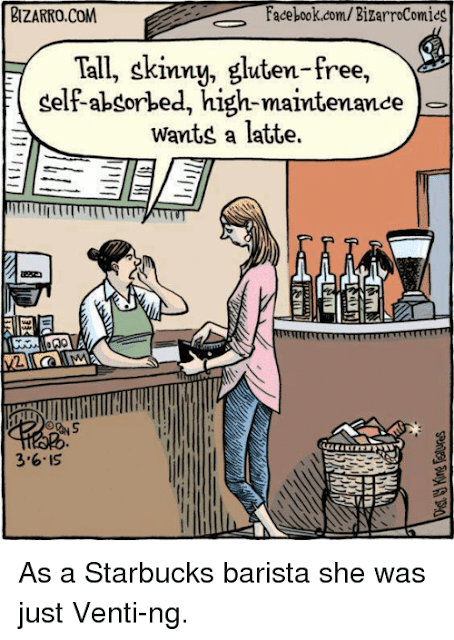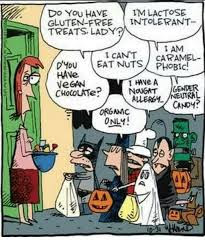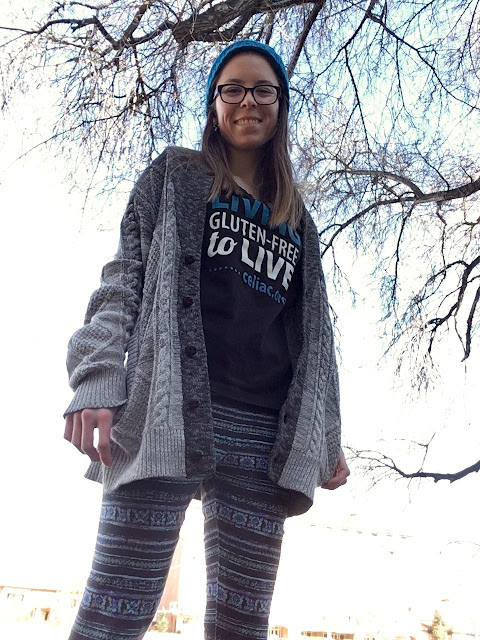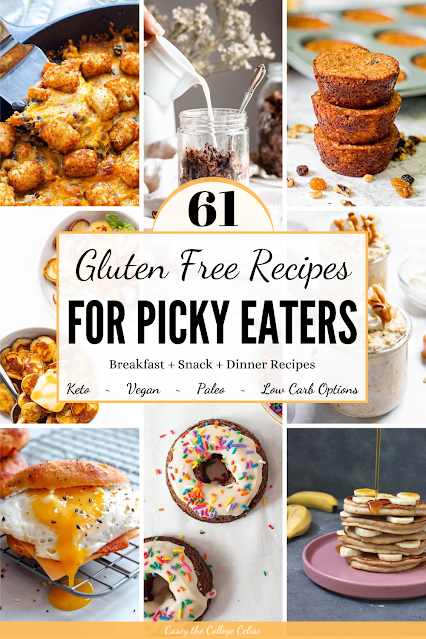To the Comics that Paint Gluten Free Eaters as "Annoying" or "High Maintenance"
When you have dietary restrictions, it's a pretty normal experience for other people to comment on the foods you do and do not eat. In the five years since my celiac diagnosis, though, I've noticed that more and more comics and commercials and ad campaigns are commenting on my gluten free diet, too. In particular, they're commenting on what people who eat gluten free are like...and the pictures they paint aren't very accurate or flattering.
So while I typically try to focus on the positives of life with celiac disease, today, I'm bringing some of these negative portrayals into the spotlight. But for a good reason, because I'm writing exactly what I want to say to the people who create these comics...to the ones who publish them...and to the people who mistakenly think they're funny. Because while I'm not necessarily someone who takes these comics or negative portrayals really personally...I know there are people in the community who do. In particular, I know there are kids who already feel "weird" or "left out" because of the foods they can't eat, and seeing their dietary restrictions being made fun of in online comics or on TV won't help matters.
So to all those people, I say...
First: I get it.
I get why you may think it's funny to show two women eating at an outdoor restaurant and have one say, "I've only been gluten free for a week, but I'm already really annoying." Because I've also been the person stuck standing in line right behind the girl placing a super complicated "gluten free" order and I know how annoying and "unnecessary" these long, time-consuming "special requests" can feel.
But I've also been that girl asking the servers at Chipotle to change their gloves and wash their hands and get fresh ingredients from the back. And that means I know something you don't.
In particular, I know how terrified that "annoying" gluten free eater is probably feeling, if they actually need to eat gluten free for a medical reason like celiac disease and can get sick from a single crumb. I know they're probably already feeling at least a little embarrassed or guilty about causing a hold up in the line or asking to talk to the chef. And if this girl is anything like me, being called annoying hurts...because she's just doing what she needs to do to survive.
Similarly, I get why it may seem funny to point out just how common gluten free diets are nowadays by sharing a comic with birds holding signs, "Is it gluten free?" for people throwing breadcrumbs in parks or showing Trick-or-Treaters asking, "Is it vegan? Is it gluten free?"
And yeah...those comic strips have a point! The truth is, the prevalence of celiac disease has NOT increased in recent years - even though the number of people who eat gluten free diets has. So even I can chuckle when faced with the fact that more and more people are giving up gluten with no medical reason to do that.
But here's the problem with these kinds of laughs: they're based on equating the gluten free diet with nothing more than a trend, a societal change in subjective values - a fad. And, yes, for some people, it is just that. But for people with celiac disease or other medical conditions...a gluten free diet is the closest thing to medicine we have. And in that way, it is very different from the "gender neutral candy" one trick-or-treat comic groups it with.
And, of course, there's one last issue I can't ignore in a lot of comic strips, not to mention commercials and marketing campaigns: the idea that all gluten free foods are also "glutton free" (though I do admire the play on words) and "gross."
Now, I'm not gonna lie. The first time I tasted gluten free bread, I thought the same thing - especially since it wasn't any of the non-cardboard-like brands I love today. But gluten free is NOT synonymous with gross. In fact, there are some pretty amazing gluten free products out on the market today. And the more people know this...the less terrified people who are newly diagnosed with celiac disease will be about their new diet. And the less teasing or side comments people will make about someone else's "special" food.
So if you design comics or approve their publishing or just laugh whenever you see something funny...I hope these are some points you keep in mind. Because even if you don't have to eat gluten free...someone does. In fact, the one person in 133 Americans with celiac disease has to eat gluten free every day to live.
And those gluten free eaters - and their friends and their loved ones - laugh and love these kind of gluten free comics a lot more:
The ones that illustrate all the challenges of being gluten free, like the "bunless burger" and "the pile of crumbs that was meant to be bread."
The ones that show two women at a grocery store, a sign saying, "Gluten free bananas are half off!", and one shopper pointing out, "All bananas are gluten free!" 'Cause that's the kinda gluten free education we're interested in spreading.
Or the ones that show how the more "free" a food is - free from gluten, from pesticides, from GMOs, you get the picture - the more pricy the bill.
Because I'm all for laughs. I'm all for comics that point out societal ironies and find humor in current cultural trends.
But celiac disease is not a joke. I am not a joke. We - everyone with a gluten free diet - are not a joke. And I hope that one day, even more comic strips, commercials and movie scripts and billboards reflect that.
No questions - just tell me your thoughts in the comments!
So while I typically try to focus on the positives of life with celiac disease, today, I'm bringing some of these negative portrayals into the spotlight. But for a good reason, because I'm writing exactly what I want to say to the people who create these comics...to the ones who publish them...and to the people who mistakenly think they're funny. Because while I'm not necessarily someone who takes these comics or negative portrayals really personally...I know there are people in the community who do. In particular, I know there are kids who already feel "weird" or "left out" because of the foods they can't eat, and seeing their dietary restrictions being made fun of in online comics or on TV won't help matters.
So to all those people, I say...
First: I get it.
I get why you may think it's funny to show two women eating at an outdoor restaurant and have one say, "I've only been gluten free for a week, but I'm already really annoying." Because I've also been the person stuck standing in line right behind the girl placing a super complicated "gluten free" order and I know how annoying and "unnecessary" these long, time-consuming "special requests" can feel.
 |
| Source |
But I've also been that girl asking the servers at Chipotle to change their gloves and wash their hands and get fresh ingredients from the back. And that means I know something you don't.
In particular, I know how terrified that "annoying" gluten free eater is probably feeling, if they actually need to eat gluten free for a medical reason like celiac disease and can get sick from a single crumb. I know they're probably already feeling at least a little embarrassed or guilty about causing a hold up in the line or asking to talk to the chef. And if this girl is anything like me, being called annoying hurts...because she's just doing what she needs to do to survive.
Similarly, I get why it may seem funny to point out just how common gluten free diets are nowadays by sharing a comic with birds holding signs, "Is it gluten free?" for people throwing breadcrumbs in parks or showing Trick-or-Treaters asking, "Is it vegan? Is it gluten free?"
 |
| Source |
And yeah...those comic strips have a point! The truth is, the prevalence of celiac disease has NOT increased in recent years - even though the number of people who eat gluten free diets has. So even I can chuckle when faced with the fact that more and more people are giving up gluten with no medical reason to do that.
But here's the problem with these kinds of laughs: they're based on equating the gluten free diet with nothing more than a trend, a societal change in subjective values - a fad. And, yes, for some people, it is just that. But for people with celiac disease or other medical conditions...a gluten free diet is the closest thing to medicine we have. And in that way, it is very different from the "gender neutral candy" one trick-or-treat comic groups it with.
 |
| Source |
Now, I'm not gonna lie. The first time I tasted gluten free bread, I thought the same thing - especially since it wasn't any of the non-cardboard-like brands I love today. But gluten free is NOT synonymous with gross. In fact, there are some pretty amazing gluten free products out on the market today. And the more people know this...the less terrified people who are newly diagnosed with celiac disease will be about their new diet. And the less teasing or side comments people will make about someone else's "special" food.
So if you design comics or approve their publishing or just laugh whenever you see something funny...I hope these are some points you keep in mind. Because even if you don't have to eat gluten free...someone does. In fact, the one person in 133 Americans with celiac disease has to eat gluten free every day to live.
And those gluten free eaters - and their friends and their loved ones - laugh and love these kind of gluten free comics a lot more:
The ones that illustrate all the challenges of being gluten free, like the "bunless burger" and "the pile of crumbs that was meant to be bread."
The ones that show two women at a grocery store, a sign saying, "Gluten free bananas are half off!", and one shopper pointing out, "All bananas are gluten free!" 'Cause that's the kinda gluten free education we're interested in spreading.
 |
| Source |
Or the ones that show how the more "free" a food is - free from gluten, from pesticides, from GMOs, you get the picture - the more pricy the bill.
Because I'm all for laughs. I'm all for comics that point out societal ironies and find humor in current cultural trends.
But celiac disease is not a joke. I am not a joke. We - everyone with a gluten free diet - are not a joke. And I hope that one day, even more comic strips, commercials and movie scripts and billboards reflect that.
No questions - just tell me your thoughts in the comments!





These are not funny, and I'm so glad you were brave and wrote this article. Medical conditions are hard enough to live with, without the social stigma that comes with things that people don't know. Stay brave!
ReplyDeleteBecause I've also been the person stuck standing in line right behind the girl placing a super complicated "gluten free" order and I know how annoying and "unnecessary" these long, time-consuming "special requests" can feel.
ReplyDeletecricut machine designs
designs for cricut machine
cricut maker templates
cricut award ideas
cricut maker vs cricut maker 3
cricut wine glass decal size chart